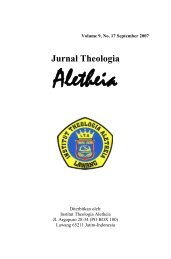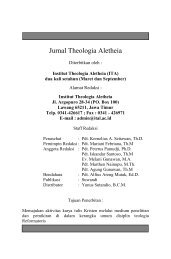download - Sekolah Tinggi Theologia Aletheia Lawang
download - Sekolah Tinggi Theologia Aletheia Lawang
download - Sekolah Tinggi Theologia Aletheia Lawang
Create successful ePaper yourself
Turn your PDF publications into a flip-book with our unique Google optimized e-Paper software.
146<br />
In theology, volitional commitment is called fiducia, or trust.<br />
Trusting faith is a total different kind of faith. The trusting faith is<br />
not only concerned with volition, choice, decision, commitment<br />
and action. Trusting faith is in fact judged by the object of faith to<br />
which trust is aimed. It is the trusted one, not the trusting one, who<br />
determines the certainty, the meaning, and the value of that trust. In<br />
other words, in trusting faith, the focus is not only on the decision<br />
and the action of the trust itself; instead, it should be on what one<br />
trusts and whom one trusts. In Christian doctrine, Christians have<br />
two objects of their trust, namely, the Truth or the Word of God<br />
and God himself. The former is called prepositional or doctrinal<br />
faith, whereas the latter is called relational or lively faith, the truth<br />
content and the life content of the faith. Simply speaking, it means<br />
knowing what you believe and whom you believe in; and willing to<br />
die for your faith, as well as willing to live for it (or him) as<br />
situation so demanded. Though the faithful ones fear no death; yet<br />
they prefer to live for their faith.<br />
It was reported, when the former Soviet Union disintegrated,<br />
many high ranking officer comrades committed suicides. The<br />
reason, among others, is that they believe in Communism that there<br />
are something worth dying for, but nothing to live for. While<br />
deaths do witness to something one believes, but when one<br />
discovers that life does not proclaim the truth, what good is it to<br />
live on? As far as the Truth is concerned, when one committed<br />
himself to an untrue ideology, there may be many reasons worth<br />
dying for it, because death irreversibly concludes all things, but<br />
there is no single reason to live for it, as to live on is too long a<br />
wasteful wait.<br />
Christian faith does stand out differently. It has the Truth as<br />
its prepositional faith; it also has the living Christ, the Savior, as its<br />
relational and life base for its faith. In such a context, trusting<br />
faiths make a believer not only willing to die for what he believes<br />
in, but make him also able to live on what he believes in. Because<br />
He lives, so shall we live, and shall we serve cheerfully (John<br />
14:19, 12:24-26). Having this trusting faith, we can exclaim as Paul<br />
once did, ―For me, to live is Christ . . .‖ and ―the life I live in the




